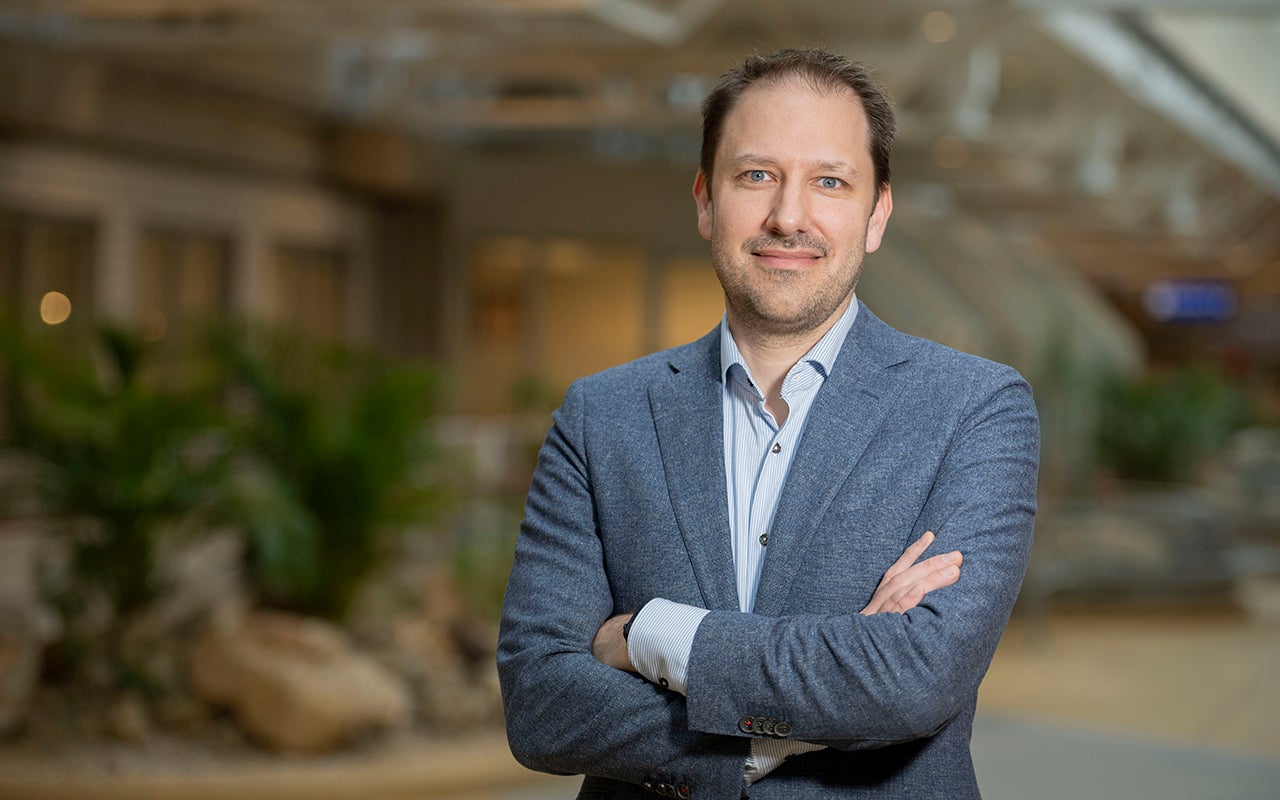"I'm a real tech guy"
"I'm a real tech guy"

How do diseases develop? How can we recognize them more quickly? And how can we treat them in a more targeted way? By analyzing very large amounts of molecular data with the latest developments in artificial intelligence (AI). This is what Jeroen de Ridder is dedicated to. As of 1 April 2024, he has been appointed as professor of bioinformatics in molecular biology at UMC Utrecht, within the Strategic Program Cancer.
Making connections. That is what Jeroen de Ridder is aiming for with his chair. "Molecular biology and medicine perform complex and detailed measurements at the level of single cells and molecules," says Jeroen.
"This leads to very large amounts of data. Thanks to bioinformatics and the latest AI developments, we now have the unique opportunity to optimally analyze this complex data. This gives us new and better insights into how diseases develop and can be diagnosed. To achieve this, it is necessary to work in interdisciplinary teams. Together, we can connect the latest AI developments with molecular biology."
Algorithm recognizes brain tumor
In recent years, Jeroen and his research group have already been successful at bringing together AI and molecular biology. He leads a so-called 'bioinformatics lab', consisting of 15 computational scientists. His team uses the latest advances in computer science, such as machine learning and AI. This allows them to analyze complex molecular datasets. This data originates, for example, from tumor tissue or blood samples taken from patients and is collected in biobanks.
Last October, Jeroen and his team made headlines around the world with Sturgeon, an algorithm they developed. "Sturgeon learns from millions of simulated realistic 'DNA snapshots'. As a result, we can determine which tumor type we are dealing with within 20 to 40 minutes."
With the help of Sturgeon, brain surgeons already discover during surgery how aggressive a tumor is, enabling them to adjust their surgery plan on the spot. Normally, they will get the results as late as a week after surgery. Then, there is a chance that the patient will have to go under the knife again. Thanks to Sturgeon, the patient only has to be operated on once.
For the Sturgeon research, Jeroen's team worked closely with researchers, neurosurgeons and pathologists from UMC Utrecht, Princess Máxima Center for Pediatric Oncology and Amsterdam UMC. A good example of the interdisciplinary approach that Jeroen is dedicated to.
"I think it's very important to make clear how we can apply science in society"
AI understands biobanks
In addition to coordinating his research team, Jeroen is also co-director of one of the five Health AI Labs at UMC Utrecht: the AI Lab for Molecular Medicine. Within this lab, powerful AI models are being developed to understand molecular data in biobanks and cohorts more quickly. The researchers aim to use the results to develop medicines and other treatments that are more precise and can be tailored to each patient.
"Within UMC Utrecht, the clinic and fundamental research are very well connected," says Jeroen. "That's absolutely essential if we want to take advantage of the opportunities that the AI revolution brings us."
Stimulating entrepreneurship
Jeroen studied electrical engineering at Delft University of Technology. It was there that he developed a passion for analyzing signals, an important component of bioinformatics. Subsequently, he obtained his PhD at Delft University of Technology and the Netherlands Cancer Institute.
In 2016, he joined UMC Utrecht and started his bioinformatics lab at the Center for Molecular Medicine. Three years later, he was also selected as one of the principal investigators within Oncode Institute. Within this independent research organization, top scientists from various Dutch institutions work closely together in the fight against cancer.
"I'm a real connector and tech guy," Jeroen explains. "Although much of my research is fundamental, I think it is very important to make clear how we can apply it in society. Sturgeon, for instance, is now used in hospital practice, in the OR. Healthcare is, of course, a wonderful area to apply science: with the latest molecular measurements and data analyses, there is so much to be gained."
In his goal to apply science more quickly, Jeroen is also a great advocate of entrepreneurship among researchers. He has also started a spin-off company himself. "Entrepreneurship can be a wonderful catalyst to make scientific findings suited to be applied in society. To ensure that scientists, and entrepreneurs, have the opportunity to learn and discover this, the path of academic entrepreneurship should be made as simple and transparent as possible," Jeroen believes.
"Everyone is always afraid of a conflict of interest. My experience is that you can't escape from this, but the solution lies in dealing with it in the correct way and communicating transparently about it. It can make a huge difference if the researchers are given the right guidance from the start. A well-integrated and proactive tech transfer office, such as Utrecht Holdings, is essential to achieve this."

